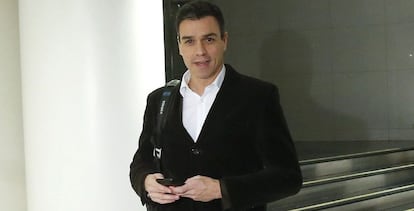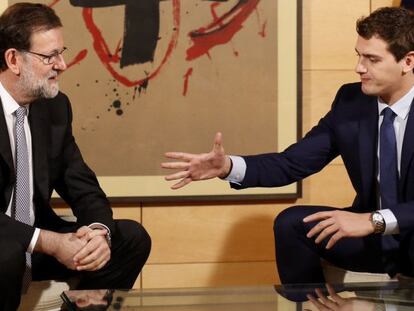Socialists ready to sign political pact with Ciudadanos
Center-right party had asked PSOE for fast-track, five-point reform of Constitution

Socialist leader Pedro Sánchez has announced that his party is ready to make an agreement with center-right grouping Ciudadanos as he seeks to form a government after the inconclusive December election.
His announcement came just hours after Ciudadanos chief Albert Rivera presented a five-point non-negotiable package for Constitutional reform as his party’s conditions for partnering with the Socialists.
“If these are the proposals, then we say yes,” said Sánchez during a news conference in Congress on Tuesday afternoon.
Rivera had said earlier that any progress for an agreement would depend on the two parties hammering out reforms to the Constitution in the first three months of the new administration.
These would include ending the practice whereby politicians and other senior state officials are immune from being tried by lower courts, known in Spanish as aforamiento; making it easier for citizens to put forward legislative proposals; depoliticizing the judiciary; removing central government representation within regional administrations; and limiting prime ministers to two terms in office.
The Socialist Party had already put forward similar proposals in its platform before the December 20 general election.
Sánchez, who came in second in the election with 90 seats, cannot hope to be voted in prime minister at the upcoming investiture sesson – which on Tuesday was moved forward by one day to March 1 – without support from Ciudadanos (which won 40 seats) or the left-leaning Podemos (69 seats, although four deputies have since broken away).
“We cannot have a government that doesn’t undertake these reforms”
Podemos had said it would not join a coalition that includes Ciudadanos, but on Monday announced that it had no problem holding discussions with the Socialists even if they continued to negotiate with Rivera’s party.
Podemos has also insisted on holding a referendum on Catalan independence during the first two years of the new term – something the Socialists have ruled out.
The investiture session was moved forward a day because of a miscalculation in the time frame needed to publish a decree for new elections – planned for June 26 if no government can be formed – in the official BOE gazette, taking into account the two-month countdown.
Sánchez will give his investiture speech at 4pm on March 1 and the session will be adjourned until the following day. Acting Prime Minister Mariano Rajoy will open the second session and will be followed by other party leaders.
The first vote will be taken later that evening. Support for Sánchez could take the form of a yes vote or, at the very least, an abstention.
“We want a corruption-free administration, one that is sensitive, and one that is reformist”
In the event of the Socialists and Ciudadanos reaching an agreement, any changes to the Constitution would require the support of the Popular Party, which has an absolute majority in the Senate and can therefore block any reforms.
“We cannot have a government that doesn't undertake these reforms,” said Rivera on Tuesday. “I know it isn’t easy, but our party can only support another that backs change.
“We want a corruption-free administration, one that is sensitive, one that is reformist, and one that tackles the deficit objectives, one that doesn't impose harsh taxes on the middle and working classes, and one that guarantees the unity of Spain.
The two parties are still at loggerheads over Ciudadanos’ plans to reform the tax system, the labor market, and the economy.
Tu suscripción se está usando en otro dispositivo
¿Quieres añadir otro usuario a tu suscripción?
Si continúas leyendo en este dispositivo, no se podrá leer en el otro.
FlechaTu suscripción se está usando en otro dispositivo y solo puedes acceder a EL PAÍS desde un dispositivo a la vez.
Si quieres compartir tu cuenta, cambia tu suscripción a la modalidad Premium, así podrás añadir otro usuario. Cada uno accederá con su propia cuenta de email, lo que os permitirá personalizar vuestra experiencia en EL PAÍS.
En el caso de no saber quién está usando tu cuenta, te recomendamos cambiar tu contraseña aquí.
Si decides continuar compartiendo tu cuenta, este mensaje se mostrará en tu dispositivo y en el de la otra persona que está usando tu cuenta de forma indefinida, afectando a tu experiencia de lectura. Puedes consultar aquí los términos y condiciones de la suscripción digital.










































